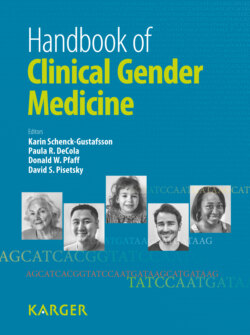Читать книгу Handbook of Clinical Gender Medicine - Группа авторов - Страница 117
На сайте Литреса книга снята с продажи.
Outstanding Issues: Sex Differences in Symptomatology
ОглавлениеDue to the highly biased sex ratio, few studies have explicitly tested the possibility that the ASC phenotype is different in males than in females. The most consistent finding regarding this issue is that females with ASC have, on average, lower IQ scores compared to males with ASC. This finding has generally been interpreted as evidence that more severe brain damage is required to produce ASC in females due to their stronger genetic protection against the condition. There are very few in-depth studies of females with ASC who do not have a comorbid intellectual disability, and sex differences in phenotypes when controlling for IQ are inconsistent between studies. For example, some studies have suggested that females with ASC show worse communication impairments than males, while others have reported the opposite. Higher rates of repetitive and stereotyped behaviors have been reported in young boys with ASC compared to girls, but the majority of studies have found no differences in the core clinical symptoms [35]. It has been suggested that the ASC phenotype in females is sufficiently distinct that it presents as a different condition, such as anorexia, which shares overlapping features with ASC such as empathizing deficits and rigid behavior.
